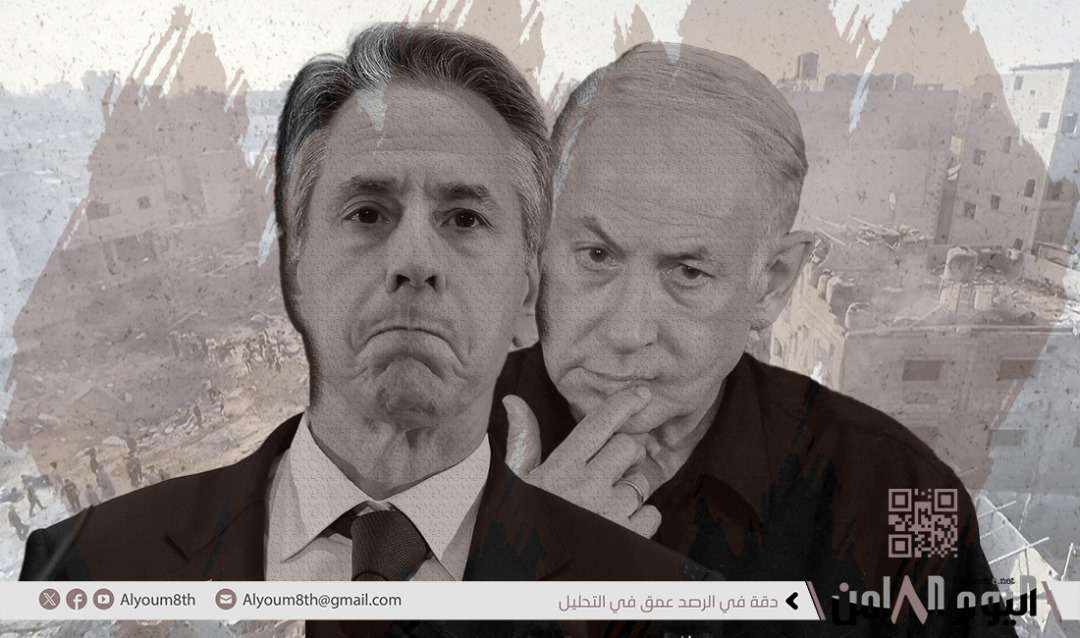...Hebrew media talk about the results of Antony Blinken's visit
Israel rejects US proposal and confirms the continuation of its war towards storming the entire Gaza Strip
.The Israeli war has displaced hundreds of thousands of Gazans from the north of the Strip to camps in the southern Strip, as Tel Aviv warned of intensifying its offensive on the Gaza City area

US Secretary of State Anthony Blinken & Israeli Prime Minister Benjamin Netanyahu - archive
Hebrew media said that the Israeli prime minister announced his rejection of a proposal made by US Secretary of State Antony Blinken, which included a temporary humanitarian truce in the Gaza Strip, which is subjected to a wide war waged by Israeli forces in order to control the strongholds of Palestinian armed factions.
Blinken, who arrived in the Israeli capital Tel Aviv, held a press conference and noted the need for fuel in Gaza while acknowledging fears of Hamas' misuse of it, vowing that "as long as the United States remains standing, Israel will not stand alone," according to the Times of Israel online newspaper.
US Secretary of State Antony Blinken reiterated Washington's desire to see humanitarian pauses in the fighting in the Gaza Strip, while acknowledging the challenge of preventing Hamas from using the temporary truce to its advantage.
Prime Minister Benjamin Netanyahu, whom Blinken met shortly before his news conference in Tel Aviv, appeared to oppose such stops, saying in a statement that he rejected any temporary cessation of fighting against Hamas that did not include "the release of our prisoners." He recalled that he said so to the top U.S. diplomat.
In another sign of the gap between the two sides, Blinken called for fuel to be supplied to the Strip alongside other humanitarian aid, saying "mechanisms" could be put in place to ensure it reaches Gaza hospitals. He also pointed to shared concerns with Israel about Hamas using fuel for its own purposes. But Netanyahu insisted that Israel "will not allow fuel to enter Gaza."
"As long as the United States remains standing, Israel will not stand alone," the US secretary of state stressed in his remarks, adding that he had expressed this in his meetings with Netanyahu, President Isaac Herzog and the war government.
He reiterated that Israel has "the right, and indeed the obligation, to defend itself and do everything in its power to make sure that the seventh of October will never happen again." But at the same time, he said that "the way Israel does it is important," adding bluntly: "We need to do more to protect Palestinian civilians."
He said that "no country should tolerate the slaughter" of its innocents, and noted that he was shown "additional photos, additional footage, collected by the Israeli government from video cameras – some of them of terrorists, others in towns that have been attacked." He said the passages were "almost outside the scope of human ability to perceive them."
Blinken said it was "shocking" that the brutality of the massacre "receded so quickly in the memories of many." This is not the case in Israel and the United States, he said, noting that 33 Americans have been killed in the massacres, along with 220 foreigners.
At the same time, he said that protecting Palestinians while Israel wages its war is "the right thing to do" and that failure to do so "plays into the hands of Palestinian factional militants."
Israel launched its war against Hamas on October 7, after the group carried out an attack in southern Israel, killing some 1,400 people and taking more than 240 hostages. In response to the killings, Israel vowed to eliminate the group and destroy its infrastructure, and since then has struck thousands of Hamas targets inside the Strip with airstrikes and an ongoing ground operation. Israel says it targets all areas where Hamas operates, while seeking to minimize civilian casualties.
Gaza's health ministry said Israeli strikes had killed more than 9,000 Palestinians. These numbers cannot be verified from external sources, and Hamas is believed to have included its members in the toll, in addition to those killed by stray rockets fired from inside the Strip.
The Israeli war has displaced hundreds of thousands of Gazans from the north to camps in the south of the Strip, while Tel Aviv warned of intensifying its offensive on the Gaza City area. The United Nations and international actors have warned of a potential humanitarian catastrophe and called on Israel to increase aid entry into the territory through Egypt's Rafah crossing.
Blinken said he had discussed with Israel what steps to take to fight under these circumstances — "advice that only best friends can give."
He stressed the need to increase the flow of aid to civilians in Gaza – where he said 100 trucks a day is not enough – and to take more steps to help get more foreign nationals out. He said he had spoken with Israeli leaders about concrete steps to meet "food, water, medicine, fuel and other basic needs."
Blinken acknowledged that legitimate questions had been raised in his conversations with Israeli officials about how best to use any humanitarian truce to allow in more aid, help secure the release of hostages, and prevent Hamas from using the moratorium to its advantage.
But he also stressed that refusing to allow such aid would anger and alienate potential peace partners. "There will be no partners for peace if they are engulfed [with concerns about] a humanitarian catastrophe [among the people of Gaza] and alienated from the supposed indifference to their plight."
He urged "humanitarian pauses" that he said could allow for enhanced security for civilians in Gaza and more effective aid. He said he had discussed with Israeli leaders "how, when and where" such pauses could occur. He noted that preparation and coordination would "take time," and there were "legitimate questions" about how to link these pauses to the release of hostages and how to avoid Hamas exploiting any such pauses.
Blinken said that just as he was pained to see the impact of the massacre on Israeli children, he had a breath of emotion as he watched Palestinian children being pulled from the rubble of buildings bombed by Israel.
"When I see them, when I look into their eyes from the TV screens, I see my children," he said. How can I not see that?"
The minister explained that Hamas does not care about the Palestinians and "brutally uses them as human shields," placing its infrastructure and fighters in residential buildings, schools, mosques and hospitals. But "civilians should not bear the consequences of these atrocities."
He added that the United States is also relentlessly focused on securing the release of hundreds of hostages held by Hamas, including Americans.
Blinken gave no indication that the United States was seeking a time limit on the war, and had already spoken of the postwar era "after the defeat of Hamas." The goal of the war, he said, could not only defeat Hamas, but also create a brighter future that included a two-state solution.
"It's about dealing with Hamas in terms of defeating it physically, making sure it can't repeat what it did on October 7. But it's also about defeating an idea – a perverted idea... which we have to fight with a better idea ... with a better vision of what this future could be and demonstrate our commitment to achieving it," Blinken said.
He said the vision of a two-state solution could "give people something to hope for" and that there is a broad and strong coalition across the region that "supports it."
"We also know that Israel cannot return to control and responsibility in Gaza. It is important to note that Israel has made it clear that it has no intention or desire to do so," he said in response to a question. He promised discussions "with partners across the region and beyond about what should happen once Hamas is defeated."
As settler violence escalated in the West Bank as the war intensified, Blinken said Israeli leaders assured him that they would condemn attacks on Palestinian civilians and take action to curb the phenomenon and hold perpetrators accountable.
"Extremist violence against Palestinians must stop. We will monitor closely to make sure our friends live up to this commitment."
US Secretary of State Antony Blinken (right) and his team meet with Prime Minister Benjamin Netanyahu (left) and members and observers of the war government, at the Israeli army headquarters "Hakiria" in Tel Aviv, November 3, 2023. (Amos Ben Gershom/GPO)
Blinken's visit was his third since the start of the war. He is due to continue attending an Arab summit in Jordan afterwards.
He said Israel's enemies aimed to destroy the country and would fail. "We will not stop until victory," he said, explaining that this means "the destruction of Hamas, the return of hostages and the restoration of security for our citizens and children."
He praised the Israeli soldiers, saying they were killing militants "around the clock" in Gaza, in close cooperation between the IDF's ground and air forces.
Regarding Blinken's visit, he said he appreciated and appreciated the support of US President Joe Biden and the United States. He said he told Blinken that "Israel rejects a temporary ceasefire that does not include the release of our hostages. Israel will not allow fuel to enter Gaza and opposes sending money to the Strip."
Earlier in the day, the Israeli military released a recording of what it said was a phone call from the previous day in which a medical official in Gaza acknowledged that Hamas's fuel reserves were stored directly under al-Shifa Hospital in Gaza City, the largest hospital in the Strip.
According to public broadcaster Kan, Israeli officials planned to submit the call, along with other evidence to that effect, to Blinken, in an effort to ease international pressure to allow fuel into the Strip.
The Israeli military said in a statement that "the call confirms that Hamas controls the energy and fuel resources in the Gaza Strip and chooses to direct them to terrorism. Moreover, if fuel is allowed ."into the Gaza Strip, Hamas plans to seize those resources
On Thursday, IDF Chief of Staff Herzi Halevy said Israel would allow fuel into Gaza through the Rafah crossing with Egypt if Israel determined hospitals had run out of fuel.
Halevy noted that hospitals in Gaza, which rely on fuel to run generators, have warned for more than a week that they are running out, but so far that has not happened.
."Shortly after Halevi's remarks, the Prime Minister's Office issued a brief statement stating only that Netanyahu "did not approve the entry of fuel into Gaza



